- 24/7 Free Consultation: (888) 424-5757 Tap Here To Call Us
MDL Lawsuit

If you or a loved one is considering legal action against a large company — such as a pharmaceutical manufacturer or medical device maker — you may eventually become part of an MDL lawsuit.
Understanding how the MDL process works is essential, especially if you’re pursuing compensation for serious injuries caused by a product that has harmed thousands of others across the country.
MDLs help organize sprawling legal matters while allowing individual plaintiffs to retain their own lawsuits. While this can offer advantages in terms of efficiency and legal leverage, there are also potential drawbacks.
At Rosenfeld Injury Lawyers, we guide clients through every step of this complex litigation, ensuring that their rights, needs, and personal outcomes remain a priority — even when their case is part of a national effort.
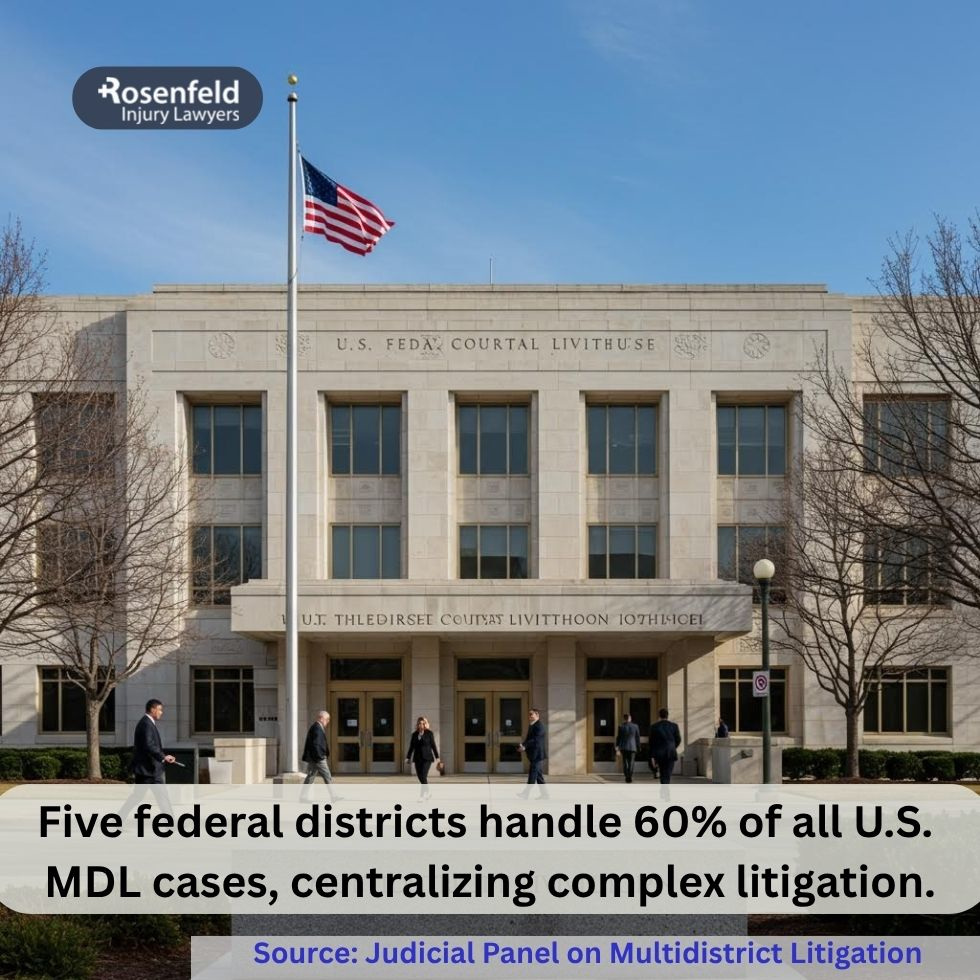
What is Multidistrict Litigation (MDL)?
Multidistrict litigation (MDL) is a legal process used by the federal court to handle large numbers of civil lawsuits that involve similar claims against the same defendant or group of defendants.
These cases often arise from defective drugs, dangerous medical devices, toxic exposure, or large-scale consumer product failures — situations where many individuals across the country suffer similar harm and seek justice through the courts.
When multiple lawsuits are filed in different federal districts, each with nearly identical factual and legal issues, the United States Judicial Panel on Multidistrict Litigation (JPML) may consolidate those cases into a single federal district court.
This central court, called the transferee court, oversees shared pretrial proceedings such as discovery, pretrial motions, and preliminary rulings. A single MDL judge is assigned to manage the consolidated docket.
Importantly, an MDL does not combine cases into a single lawsuit the way a class action does. Each plaintiff in an MDL keeps their own lawsuit, including the right to a separate trial and personalized damages.
This structure is especially beneficial for people who have suffered unique or severe injuries, where a “one size fits all” class action settlement would not provide fair compensation.
How MDLs Differ from Class Action Lawsuits
Multidistrict litigation (MDL) and class action lawsuits are often confused, but they are two distinct legal mechanisms within the federal court system. Both are used to manage civil cases involving numerous plaintiffs and similar claims, but they operate very differently — especially in how they treat the rights of the individuals involved.
In an MDL, each person files and retains their own individual lawsuit. Although these cases are transferred and consolidated into a single federal district court for efficiency during pretrial proceedings, the lawsuits remain separate.
Plaintiffs maintain control over their case, damages are determined individually, and if a case does not settle, it may be sent back to its original court for trial — a process known as remand.
In contrast, a class action involves a single lawsuit filed on behalf of a defined group, or “class,” of plaintiffs who share essentially the same complaint. One or more representative plaintiffs are approved by the court to stand in for all members of the class.
This approach works best when all claimants suffered nearly identical harm and the court can resolve the matter through a single trial. In a class action, plaintiffs typically do not have individual control over how their claims are handled.
Class actions also require a formal class certification process under Federal Rule of Civil Procedure 23, where the court must determine that the plaintiffs’ claims are sufficiently similar. MDLs do not.
Instead, cases are consolidated for coordination, but each plaintiff remains a separate party with their own right to compensation based on the merits of their specific claim.
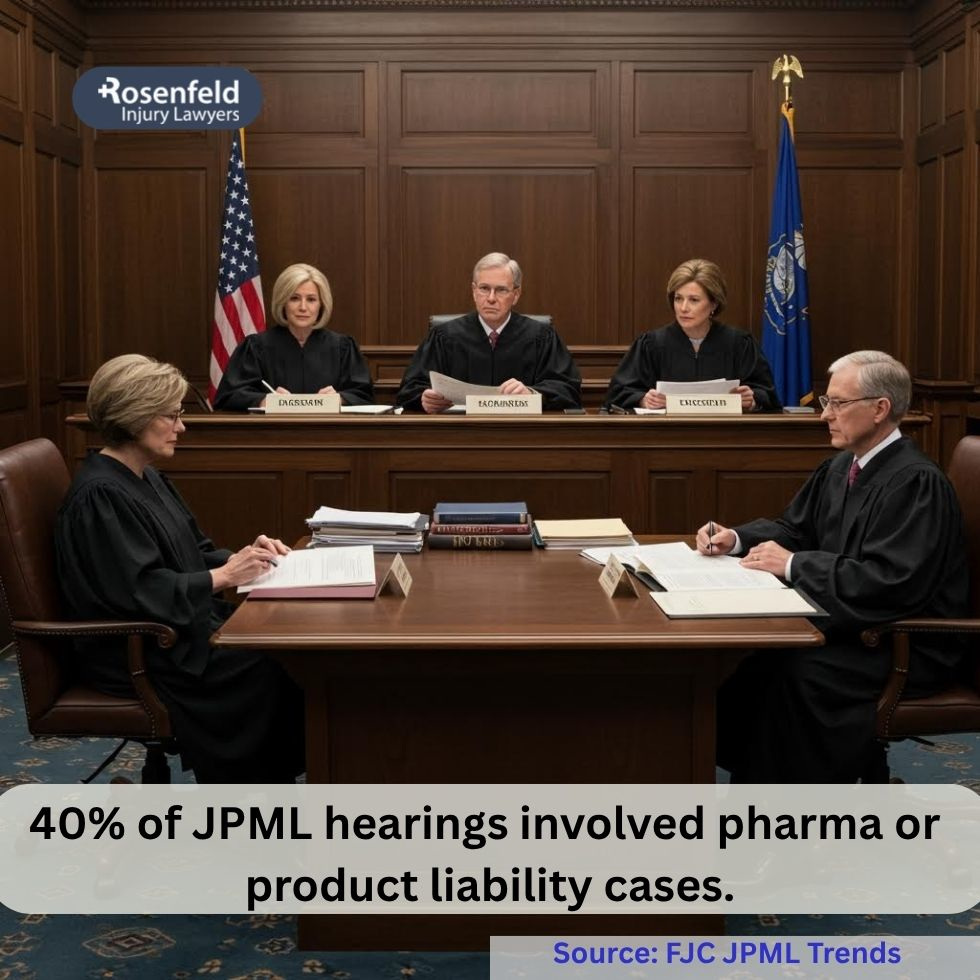
The Role of the Judicial Panel on Multidistrict Litigation (JPML)
The decision to create an MDL isn’t made by the parties or the court where a case is filed. Instead, that authority lies with the JPML — a special body within the federal court created to manage complex litigation involving civil actions filed in different federal courts but sharing common issues.
The JPML is made up of seven federal judges, appointed by the Chief Justice of the Supreme Court, who evaluate whether consolidating cases into an MDL will promote efficiency, prevent duplicative discovery, and reduce the risk of conflicting rulings. The panel meets several times a year to consider motions for consolidation filed by plaintiffs or defendants.
If the panel determines that multiple civil lawsuits filed in federal districts involve common questions of fact, they may issue an order transferring those cases to a single federal district court to be overseen by a single MDL judge.
The panel considers:
- The number of remaining cases
- The similarity of the allegations and legal issues
- Whether consolidation would serve judicial economy
- The convenience of the parties involved and witnesses
Once transferred, the MDL is managed through coordinated pretrial proceedings, including discovery and preliminary motions, while preserving each plaintiff’s right to pursue their own trial if needed.
An individual in Illinois may file a case in the Northern District of Illinois, and the JPML may transfer it to an MDL based in another state. Alternatively, if enough cases originate in Illinois, the JPML might assign the MDL court to a federal judge here.
Common Types of Cases Consolidated into MDLs
While any type of civil action can technically be considered for consolidation, the United States Judicial Panel on Multidistrict Litigation (JPML) most often creates MDLs for the following categories:
Defective Drugs
Claims involving defective or dangerous pharmaceuticals are among the most common types of MDLs. These lawsuits often allege that drug companies failed to warn about serious side effects or marketed unsafe medications.
Examples include:
Illinois residents prescribed these medications may become part of nationwide MDLs litigated in a single federal district court.
Medical Devices
Defective medical device lawsuits also frequently lead to MDL consolidation. These cases often involve serious complications following surgeries or implants.
Common examples:
- Hernia mesh implants
- Bard Powerport
- Hip replacements, like Stryker and Wright
Patients in Illinois who suffered injuries from these devices can benefit from the shared resources and coordinated litigation of an MDL while still pursuing an individual lawsuit.
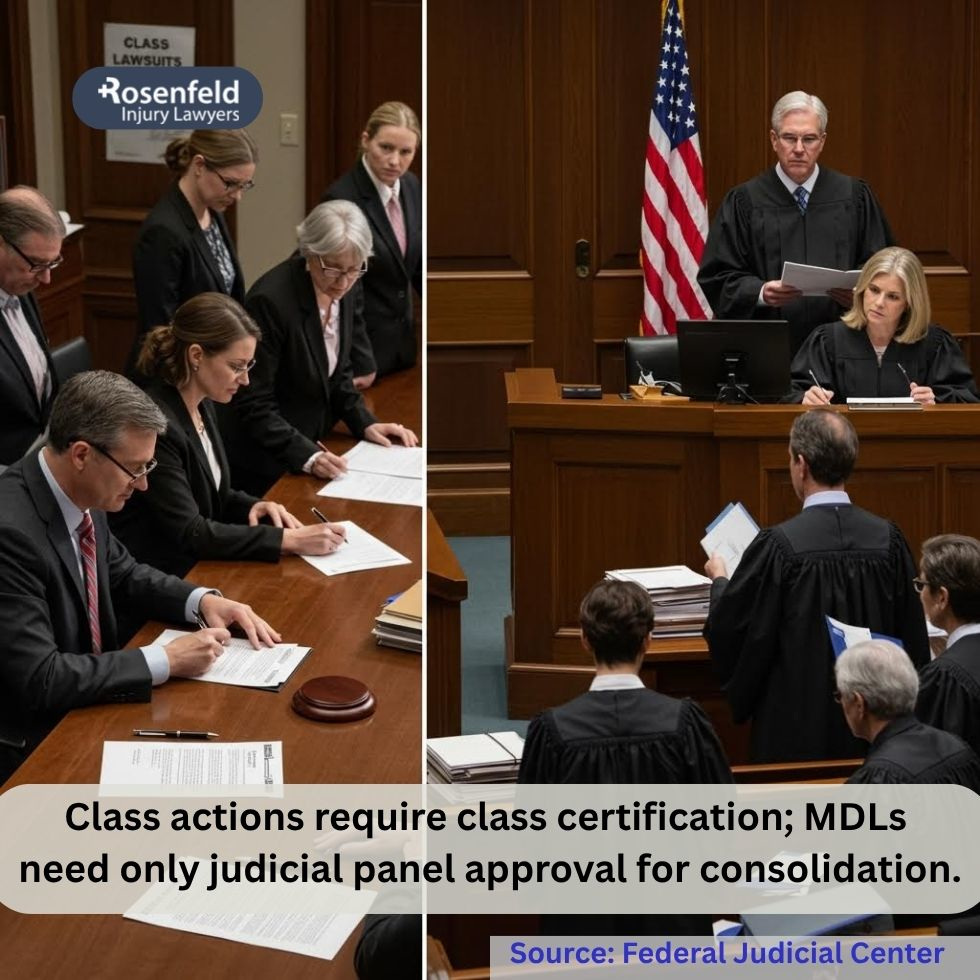
Mass Tort Cases
MDLs are often created for large-scale mass tort cases involving environmental harm, industrial accidents, or dangerous consumer products.
Examples:
These types of complex product liability cases often involve thousands of plaintiffs and can take years to resolve, making MDL consolidation essential for managing discovery and bellwether trials.
Data Breaches and Consumer Protection Claims
The JPML also consolidates cases involving major data breaches, defective consumer goods, and even employment practices. While less medically focused, these MDLs still benefit from centralized legal proceedings when similar claims are spread across multiple plaintiffs and district courts.
The MDL Process
The MDL process is designed to streamline complex litigation across federal courts by consolidating similar civil cases for coordinated handling. While each plaintiff retains their own individual lawsuit, the legal steps in an MDL follow a defined structure that benefits both courts and parties.
Below is a breakdown of how multidistrict litigation typically unfolds, from case transfer to final resolution.
Transfer and Consolidation of Cases
Once the Judicial Panel on Multidistrict Litigation (JPML) approves consolidation, cases from different federal districts are transferred to a single federal district court. A chief judge is assigned to manage all pretrial proceedings, helping avoid duplicate discovery and inconsistent rulings.
An Illinois plaintiff might file in the Northern District of Illinois, but their case could be transferred to an MDL in a different state — or vice versa, depending on the JPML’s decision.
Appointment of Lead Counsel and Steering Committees
The MDL court appoints lead counsel and a plaintiffs’ steering committee (PSC) to manage key aspects of the litigation on behalf of all the plaintiffs. These attorneys coordinate evidence gathering, develop legal strategies, and handle common pretrial MDL motions.
Defendants may also have a defendant steering committee appointed to represent their collective interests.
Coordinated Pretrial Proceedings
The central benefit of MDL is efficient management of shared issues. This includes:
- Broad discovery (document production, depositions, expert reports)
- Key pretrial motions on admissibility, jurisdiction, and other legal questions
- Selection of bellwether trials — a small group of representative cases tried early to help gauge outcomes and influence settlement negotiations
All of this occurs in the transferee court under the guidance of the assigned MDL judge.
Settlement Negotiations and Global Settlements
As discovery progresses and bellwether results come in, parties often enter into settlement negotiations. In some cases, the defendant may agree to a global settlement framework that allows individuals to opt in and resolve their claims without trial.
At Rosenfeld Injury Lawyers, we help Illinois clients evaluate any multidistrict litigation settlements carefully to ensure they reflect the true value of their injuries.
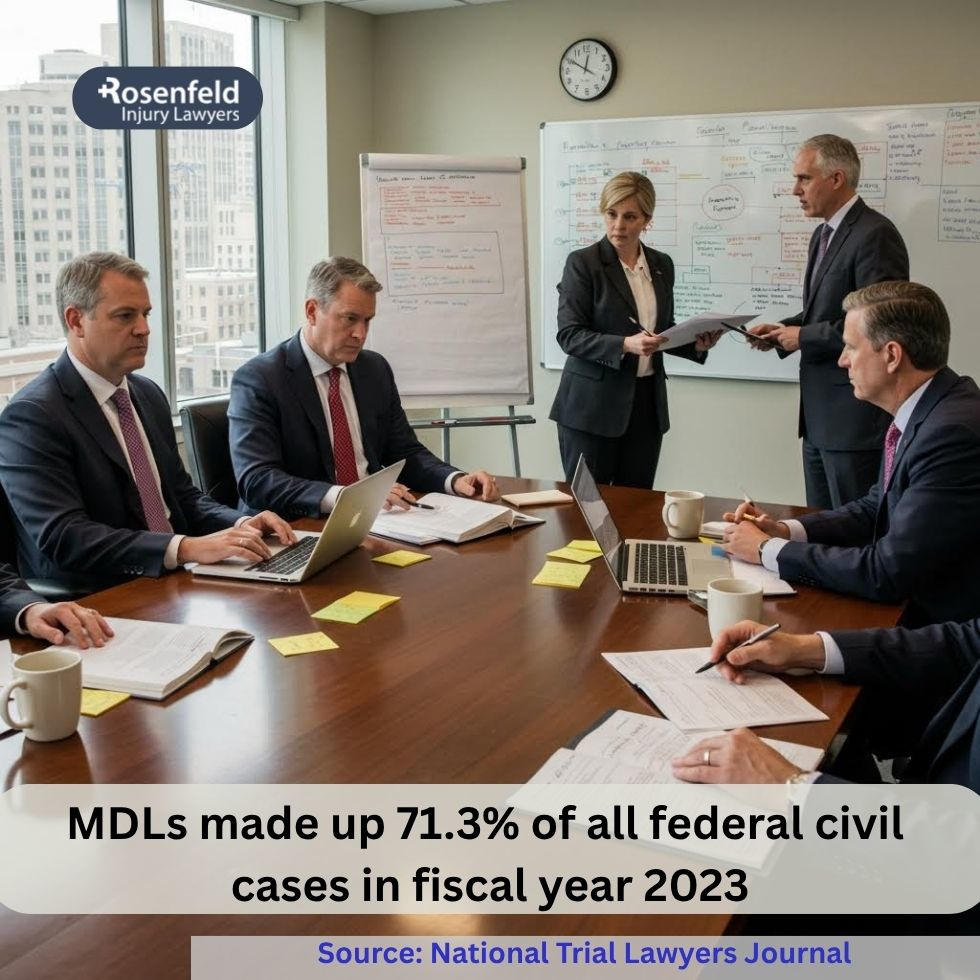
Remand Back to Original Courts for Trial
If your case doesn’t settle during the multidistrict litigation process, it is typically remanded back to the original court where it was filed for trial. This means that even though your case moved through pretrial proceedings with many others, you still retain your right to a separate trial in your home jurisdiction, such as federal court in Chicago or Springfield.
Benefits and Drawbacks of Participating in an MDL
For many Illinois plaintiffs, joining a multidistrict litigation (MDL) offers a practical path to justice when facing powerful corporate defendants. But like any legal process, MDLs come with both advantages and limitations. At Rosenfeld Injury Lawyers, we help clients understand how this legal structure might impact their individual lawsuit.
Advantages of MDLs
Here are some of the main advantages of multidistrict litigation.
Efficiency and Cost Savings
By consolidating similar civil actions into one court, MDLs reduce duplicative legal work. Shared discovery, coordinated pretrial processes, and joint expert witnesses lower litigation costs for individual plaintiffs and speed up the overall legal process.
Access to Resources and Expertise
Even if your case is relatively small, being part of an MDL gives you access to top-tier plaintiffs’ lawyers, legal teams, and scientific experts. The counsel and steering committees bring deep experience in complex cases.
Stronger Negotiating Position
With hundreds or thousands of similar claims consolidated, plaintiffs collectively have more leverage. This often leads to larger, more favorable MDL settlements, particularly after bellwether trials reveal patterns of liability.
Disadvantages of MDLs
Here are some of the main disadvantages of multidistrict litigation.
Less Individual Control Over Your Case
Since your case becomes part of a coordinated group, key strategic decisions — including settlement frameworks and trial selection — are typically made by the counsel or steering committee, not your personal attorney.
Potential for Delays
While MDLs aim to streamline litigation, they can move slowly due to the number of parties involved and the complexity of issues. Pretrial disputes, appeals, and bellwether trial schedules can stretch the process over several years.
“One Size Fits All” Settlements May Not Be Fair to All
A global payout may offer set tiers based on injury type or exposure, which don’t always reflect your unique circumstances. This can be especially concerning in cases involving permanent injuries, rare complications, or wrongful death.
Major MDLs in the United States
Hundreds of multidistrict litigations are active at any given time in the U.S., covering everything from defective drugs to environmental mass torts. These large, coordinated legal efforts allow people from across the country — including Illinois — to seek justice against powerful corporations.
At Rosenfeld Injury Lawyers, we closely monitor active and emerging MDLs to ensure our clients are positioned to participate when appropriate. Below are examples of high-profile MDLs that illustrate the scope and scale of this process.
Examples of Product Liability MDLs
These MDLs often involve complex cases where plaintiffs allege injury or death caused by dangerous drugs or faulty medical devices, such as:
- OPMS Kratom – People using these products have reported everything from mild symptoms like nausea to severe health issues such as seizures, and in extreme cases, it’s been linked with fatalities.
- Paragard IUD – A widely used copper IUD has been linked to device breakage during removal, causing internal injuries.
Illinois residents who’ve been harmed by these or similar products may be eligible to join an existing federal court MDL or file a claim that may be consolidated into one.
Examples of Mass Tort MDLs
Some MDLs focus on large-scale exposure to harmful substances or systemic corporate misconduct, such as:
- AFFF Firefighting Foam – Firefighters and military personnel allege long-term PFAS exposure led to cancer and other health issues.
- Roundup (Glyphosate) – Plaintiffs claim Monsanto’s popular weedkiller caused non-Hodgkin lymphoma and other cancers after prolonged exposure.
As new MDLs continue to emerge in the federal court, Illinois plaintiffs must act quickly to preserve their rights, particularly before claim deadlines or settlements are reached.
The Importance of Experienced Legal Representation in MDL Cases
Navigating a multidistrict litigation (MDL) is not the same as handling a routine personal injury case. These are highly technical, heavily coordinated processes within the federal legal system, often involving powerful defendants, complex scientific evidence, and national teams of attorneys. For plaintiffs in Illinois, the right attorney can make all the difference.
At Rosenfeld Injury Lawyers, we have the experience and resources to represent individuals in major MDLs, while still giving each client the personalized attention their case deserves.
Protecting Your Rights and Interests
In an MDL, decisions are often made by lead counsel or a plaintiffs’ steering committee. While this structure helps streamline the pretrial process, it can leave plaintiffs with less direct control.
That’s why it’s essential to have your own attorney — someone who’s solely focused on your case and who ensures:
- Your medical records, injuries, and financial losses are fully documented
- You’re not overlooked in the global payout process
- You understand every option before accepting or rejecting a resolution
- Your voice is heard, even in large-scale litigation
Our law firm represents Illinois plaintiffs with the goal of keeping their case active, visible, and prioritized — even within the nation’s most crowded MDLs.
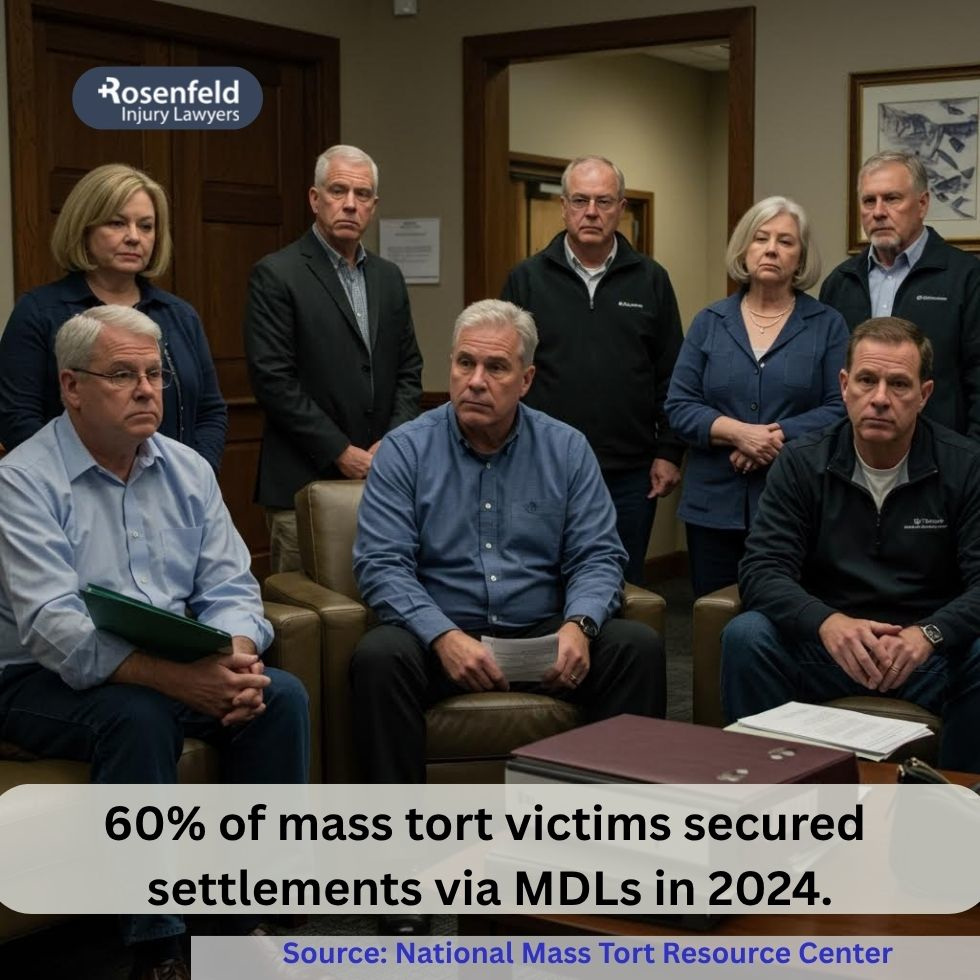
Maximizing Your Potential Compensation
MDLs often result in substantial settlements, but those settlements may be offered in broad tiers. An experienced MDL attorney can fight to ensure your compensation matches the severity of your injuries, especially in cases involving:
- Permanent disability
- Crush injuries or disfigurement
- Wrongful death of a loved one
- Long-term medical costs or loss of income
Our law firm helps clients in Illinois evaluate the fairness of multidistrict litigation settlements, pursue supplemental claims if available, and negotiate for the highest possible recovery.
Contact a Personal Injury Lawyer for a Free Consultation!

If you believe you have a case that could become part of a multidistrict litigation (MDL) — or if you’ve already received notice that your claim has been consolidated — now is the time to speak with an attorney who understands the complexities of the federal legal system and the national civil rules of litigation.
At Rosenfeld Injury Lawyers, we represent individuals across Illinois in a wide range of complex cases. Our mass tort law firm will help you:
- Determine whether your case qualifies for inclusion in an MDL
- Preserve your right to compensation within the broader litigation
- Maintain control over your claim and ensure you’re treated as an individual, not just a case number
- Navigate deadlines, discovery, pretrial proceedings, and potential settlement options
- File your claim in the correct federal district court, whether in Illinois or through MDL transfer
You don’t have to face this legal process alone. Our Chicago personal injury lawyer team is here to protect your rights, advocate for your best outcome, and help you in your search for justice against major corporations responsible for dangerous products or negligent practices.
Schedule your free consultation today by calling (888) 424-5757 or filling out our online contact form. We’re here to fight for you — every step of the way.
All content undergoes thorough legal review by experienced attorneys, including Jonathan Rosenfeld. With 25 years of experience in personal injury law and over 100 years of combined legal expertise within our team, we ensure that every article is legally accurate, compliant, and reflects current legal standards.







